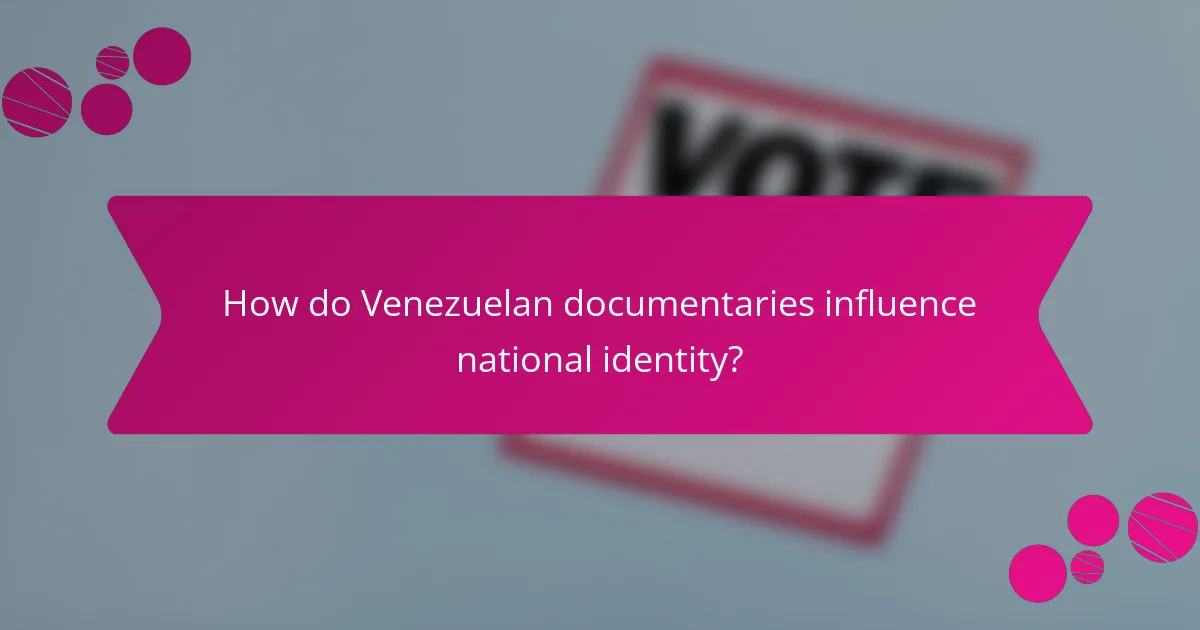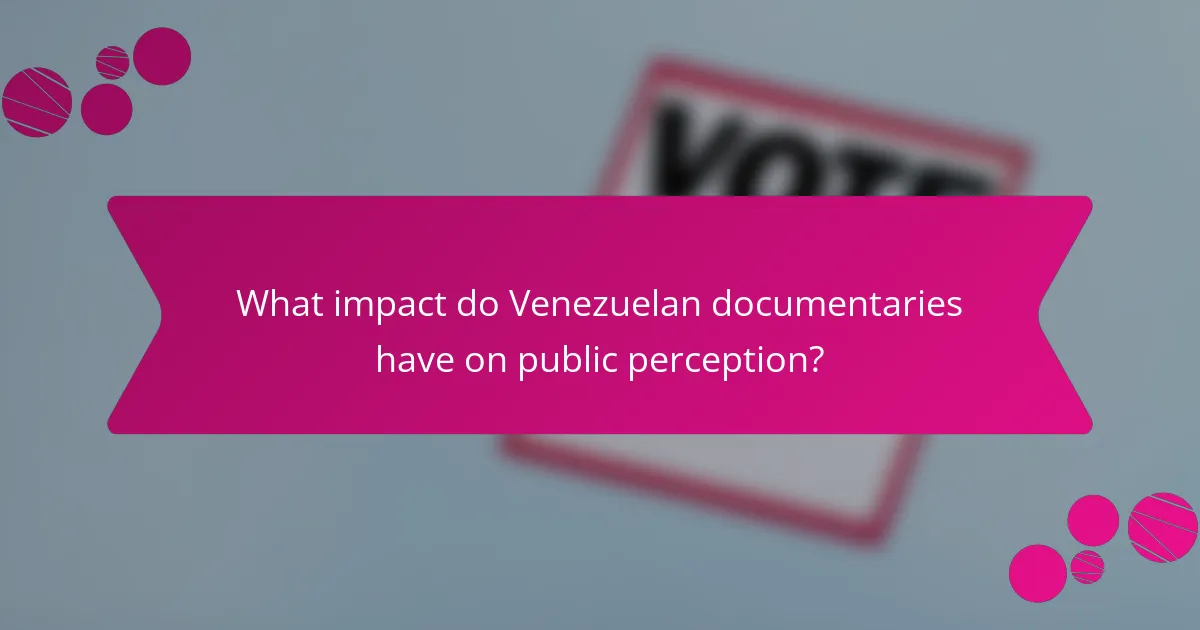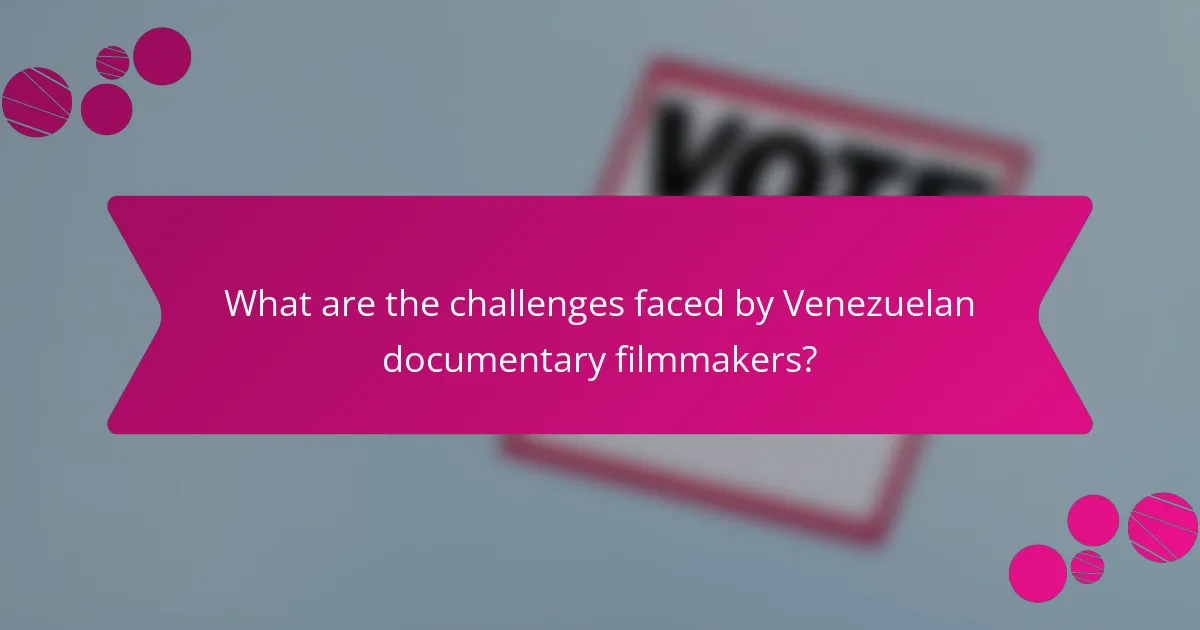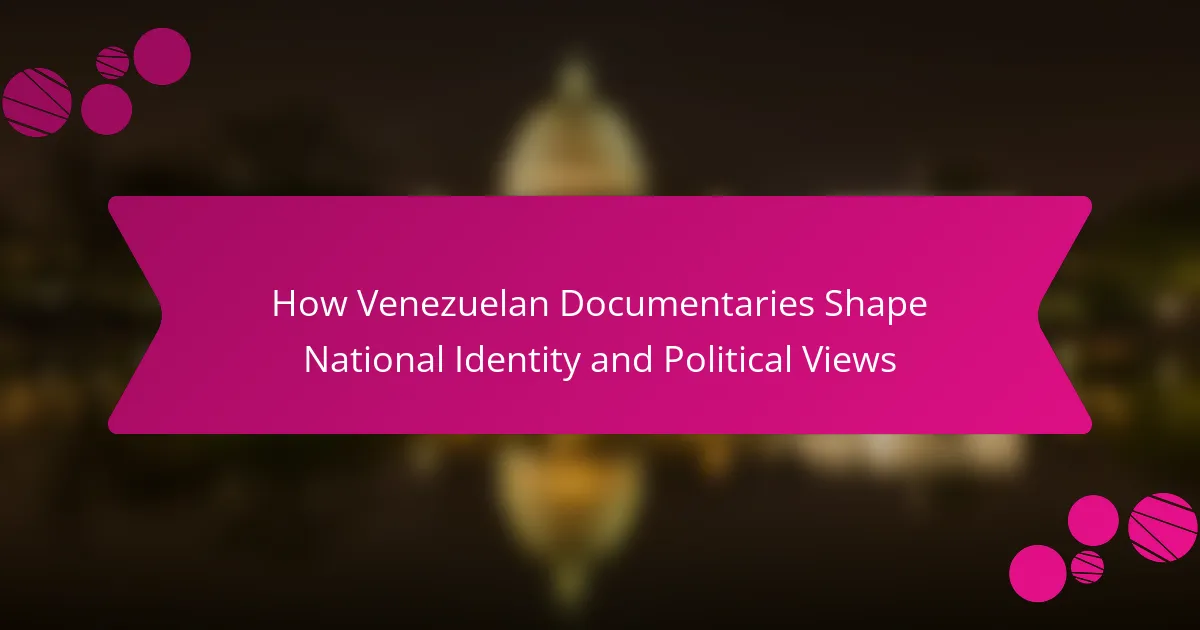
How do Venezuelan documentaries influence national identity?
Venezuelan documentaries significantly influence national identity by depicting cultural narratives and historical contexts. They often showcase the struggles and triumphs of the Venezuelan people. This representation fosters a sense of unity and shared experience among citizens. Documentaries highlight social issues, contributing to public discourse and awareness. They also preserve cultural heritage, reinforcing national pride. By presenting diverse perspectives, these films encourage critical reflection on identity. Notably, works like “El abrazo de la serpiente” illustrate the complexities of Venezuelan history. Such documentaries serve as tools for cultural expression and political commentary, shaping collective identity.
What themes are prevalent in Venezuelan documentaries?
Venezuelan documentaries often explore themes of social justice, political unrest, and cultural identity. These films frequently depict the struggles faced by marginalized communities. They highlight issues such as poverty, inequality, and government corruption. Many documentaries focus on the impact of the Venezuelan crisis on daily life. They also emphasize the resilience and creativity of the Venezuelan people. Environmental concerns are another prevalent theme, showcasing the effects of resource exploitation. Additionally, documentaries often reflect on historical narratives and national pride. These themes collectively shape the viewer’s understanding of Venezuela’s complex socio-political landscape.
How do these themes reflect Venezuelan culture and history?
Themes in Venezuelan documentaries reflect the country’s culture and history by showcasing social issues and historical events. Documentaries often highlight the struggles of the Venezuelan people, including economic hardship and political turmoil. They depict the rich cultural heritage, such as music, dance, and traditional practices. Historical narratives in these films provide context for contemporary challenges. For example, themes of resilience and community solidarity are prevalent. These elements reveal the national identity shaped by both historical events and cultural expressions. The portrayal of iconic figures and movements also emphasizes the collective memory of Venezuelans. Thus, these themes serve as a mirror of Venezuela’s complex societal landscape.
What role do personal stories play in shaping national identity?
Personal stories play a crucial role in shaping national identity. They provide a means for individuals to express their experiences and perspectives. These narratives often reflect cultural values and historical contexts. In Venezuelan documentaries, personal stories highlight the struggles and resilience of citizens. They create a collective memory that resonates with viewers. This shared understanding fosters a sense of belonging among the population. Moreover, personal stories can challenge dominant narratives and promote social change. For example, documentaries like “The Last Resort” showcase personal accounts of migration, influencing public perception of national identity. Such stories contribute to a richer, more nuanced understanding of what it means to be part of a nation.
How do Venezuelan documentaries portray political views?
Venezuelan documentaries often portray political views through critical narratives and personal testimonies. These films highlight the socio-political climate in Venezuela, particularly during and after Hugo Chávez’s presidency. Many documentaries focus on themes of government corruption, human rights abuses, and social inequality. For instance, “The Revolution Will Not Be Televised” depicts the 2002 coup attempt against Chávez, emphasizing media manipulation and public dissent. Documentaries like “The Last Days of Venezuela” showcase the struggles of everyday citizens amid economic turmoil, reflecting a grassroots perspective on political issues. This approach helps viewers understand complex political dynamics through relatable human experiences. Overall, Venezuelan documentaries serve as a vital medium for political expression and social critique.
What political issues are commonly addressed in these documentaries?
Venezuelan documentaries commonly address issues such as government corruption, human rights violations, and economic instability. These films often highlight the impact of political decisions on everyday life. They focus on the struggles of citizens under authoritarian regimes. Documentaries also explore the role of media censorship in shaping public perception. Additionally, they examine the effects of foreign intervention on national sovereignty. Many documentaries present personal stories to illustrate broader political themes. These narratives help to foster a sense of national identity among viewers. Overall, the political issues depicted in these documentaries reflect the complexities of Venezuelan society.
How do filmmakers navigate censorship and government influence?
Filmmakers navigate censorship and government influence by employing various strategies. They often use metaphor and allegory to convey messages subtly. This approach allows them to bypass direct censorship. Filmmakers also collaborate with international organizations for support and visibility. This collaboration can provide funding and distribution channels. Additionally, they may engage in grassroots movements to raise awareness. Public screenings can create community dialogue about sensitive topics. Some filmmakers choose to work in exile to maintain creative freedom. Historical examples include Venezuelan filmmakers who faced government pushback yet continued to produce impactful work.

What impact do Venezuelan documentaries have on public perception?
Venezuelan documentaries significantly influence public perception by shaping narratives around social and political issues. These films often highlight the struggles and resilience of the Venezuelan people. They provide a platform for underrepresented voices and perspectives. By documenting real-life experiences, they foster empathy and awareness among viewers. Research shows that documentaries can alter viewers’ attitudes and beliefs about political situations. For instance, the documentary “El Amparo” sheds light on human rights abuses, prompting public discourse. This engagement can lead to increased activism and civic participation. Ultimately, Venezuelan documentaries play a crucial role in informing and transforming public perception.
How do audiences respond to documentaries in Venezuela?
Audiences in Venezuela respond to documentaries with a mix of engagement and critical reflection. Documentaries often resonate deeply due to the country’s complex socio-political landscape. Viewers frequently express strong emotional connections to the stories presented. This engagement is heightened by the relevance of the topics to their daily lives. Many documentaries address social issues, political unrest, and cultural identity. Audiences often discuss these themes in public forums and social media. Research shows that documentaries can influence public opinion and awareness. For example, a study by the Universidad Central de Venezuela highlights how documentaries shape perceptions of national identity.
What factors influence audience reception of documentary content?
Audience reception of documentary content is influenced by several key factors. These factors include the documentary’s narrative style, emotional appeal, and the credibility of the filmmakers. Research indicates that documentaries with a strong narrative structure tend to engage viewers more effectively. Emotional resonance also plays a crucial role; studies show that emotionally charged content can enhance audience connection and retention. Additionally, the perceived credibility of the filmmakers significantly affects audience trust and acceptance of the content. For example, documentaries produced by established filmmakers or organizations are often viewed as more reliable. Cultural context and personal experiences of the audience further shape their interpretation and reception of documentary narratives.
How do documentaries contribute to social movements in Venezuela?
Documentaries contribute to social movements in Venezuela by raising awareness of social issues. They highlight human rights abuses and government corruption. This exposure mobilizes public opinion and encourages activism. Documentaries often feature personal stories that resonate emotionally with viewers. They can inspire solidarity among citizens and foster a sense of community. Additionally, documentaries serve as historical records of social struggles. They document events that may be overlooked by mainstream media. By providing a platform for marginalized voices, they amplify calls for change.
In what ways do documentaries shape political activism?
Documentaries shape political activism by raising awareness and educating viewers on critical issues. They provide in-depth analysis and personal stories that humanize complex topics. This emotional connection can motivate viewers to take action. Documentaries often highlight social injustices, prompting public discourse. They can mobilize communities around specific causes, leading to organized movements. For instance, the documentary “The Act of Killing” sparked conversations about human rights abuses in Indonesia. Additionally, documentaries can influence policymakers by presenting compelling narratives. They serve as tools for advocacy, helping organizations amplify their messages. Overall, documentaries play a crucial role in informing and inspiring political engagement.
What examples exist of documentaries leading to political change?
Documentaries can significantly influence political change. One notable example is “The Act of Killing,” which highlighted the Indonesian mass killings of 1965-66. This film led to increased awareness and discussions about human rights violations in Indonesia. Another example is “13th,” which examined racial inequality in the United States. This documentary sparked conversations about criminal justice reform. “Food, Inc.” raised awareness about the food industry, leading to changes in food policies and consumer behavior. “Blackfish” brought attention to the treatment of orcas in captivity, resulting in policy changes for marine parks. Each of these documentaries prompted public discourse that ultimately contributed to political or social reforms.
How do filmmakers engage with communities to foster activism?
Filmmakers engage with communities to foster activism by creating documentaries that reflect local issues and narratives. They collaborate with community members to ensure authentic representation. This collaboration builds trust and encourages participation in the filmmaking process. Filmmakers often host screenings and discussions to spark dialogue around the issues presented. These events serve as platforms for community voices and perspectives. Additionally, filmmakers utilize social media to amplify community stories and mobilize support. By highlighting specific social injustices, they inspire activism and collective action. Research indicates that documentaries can significantly raise awareness and drive community engagement in social movements.

What are the challenges faced by Venezuelan documentary filmmakers?
Venezuelan documentary filmmakers face significant challenges including censorship and limited funding. Censorship restricts their ability to freely express ideas. The government often controls media narratives, impacting content creation. Limited funding hampers production quality and distribution opportunities. Many filmmakers rely on personal resources or small grants. Access to equipment and technology is also constrained. Additionally, political instability creates a hostile environment for filmmakers. These challenges hinder the growth and visibility of Venezuelan documentary cinema.
How does economic instability affect documentary production?
Economic instability significantly impacts documentary production in Venezuela. It restricts funding opportunities for filmmakers. Many projects face budget cuts or cancellations due to financial constraints. Filmmakers often struggle to access necessary resources and equipment. This situation limits the scope and quality of documentaries produced. Economic challenges also affect distribution channels for completed works. Audiences may have reduced access to screenings and festivals. The overall narrative may shift to focus on survival and resilience amid hardship.
What resources are available for filmmakers in Venezuela?
Filmmakers in Venezuela have access to various resources. These include local film schools such as the Universidad Central de Venezuela and the Escuela de Artes Visuales. Government initiatives like the National Film Institute provide funding and support. Additionally, film festivals such as the Mérida Film Festival showcase local talent. Non-profit organizations also offer workshops and networking opportunities. Access to equipment rental services is available in major cities. Online platforms facilitate distribution and promotion of Venezuelan films. These resources collectively aid filmmakers in developing their projects and reaching audiences.
How do filmmakers overcome barriers to distribution?
Filmmakers overcome barriers to distribution through innovative strategies and collaborations. They often leverage digital platforms to reach wider audiences. Social media serves as a powerful tool for promotion and engagement. Collaborating with local and international festivals enhances visibility. Building partnerships with streaming services expands distribution channels. Filmmakers may also engage in grassroots marketing to connect with communities. Additionally, they seek funding from grants and organizations that support independent cinema. These approaches collectively help filmmakers navigate the challenges of distribution effectively.
What are best practices for creating impactful documentaries in Venezuela?
To create impactful documentaries in Venezuela, filmmakers should prioritize authentic storytelling. Authentic stories resonate with audiences and can reflect the complexities of Venezuelan society. Engaging with local communities is essential for gathering genuine narratives. This approach fosters trust and ensures representation of diverse voices.
Incorporating historical context enriches the documentary’s content. Understanding Venezuela’s political and social landscape provides depth to the narratives. Filmmakers should also focus on high production quality. Clear visuals and sound enhance viewer engagement and retention.
Utilizing local talent can bring unique perspectives and authenticity to the project. Collaborating with Venezuelan artists and experts strengthens the documentary’s cultural relevance. Moreover, addressing current issues can make the documentary timely and impactful.
Finally, leveraging digital platforms for distribution expands reach. Online access allows wider audiences to engage with the documentary’s themes and messages.
How can filmmakers effectively engage their audience?
Filmmakers can effectively engage their audience by creating relatable narratives. Relatable narratives resonate with viewers’ personal experiences. This connection fosters emotional investment in the story. Additionally, filmmakers should utilize strong visual storytelling techniques. Visual elements enhance the emotional impact of the narrative. Engaging sound design also plays a crucial role. Soundtracks and sound effects can evoke specific emotions. Furthermore, interactive elements can deepen audience involvement. For instance, Q&A sessions after screenings encourage audience participation. Research shows that films with strong emotional resonance lead to higher audience retention. Engaging storytelling techniques can significantly enhance viewer engagement and connection.
What strategies can be employed to ensure the preservation of cultural narratives?
Strategies to preserve cultural narratives include documentation, education, and community engagement. Documentation involves recording oral histories and traditional practices. This can be achieved through interviews and written records. Education plays a vital role in teaching younger generations about their cultural heritage. Schools can incorporate local history and traditions into their curricula. Community engagement fosters participation in cultural events and storytelling sessions. These activities strengthen communal ties and encourage the sharing of narratives. Collaborations with local artists and filmmakers can further amplify cultural expressions. Documentaries serve as a powerful medium to capture and disseminate these narratives. They can reach wider audiences and stimulate discussions about cultural identity.
Venezuelan documentaries serve as a critical medium for shaping national identity and political views by depicting cultural narratives and historical contexts. They highlight themes such as social justice, political unrest, and the struggles faced by marginalized communities, fostering a sense of unity and shared experience among citizens. Through personal stories and critical narratives, these films engage audiences and influence public perception, contributing to social movements and political activism. Additionally, filmmakers navigate challenges like censorship and economic instability while employing strategies to preserve cultural narratives and enhance audience engagement.
